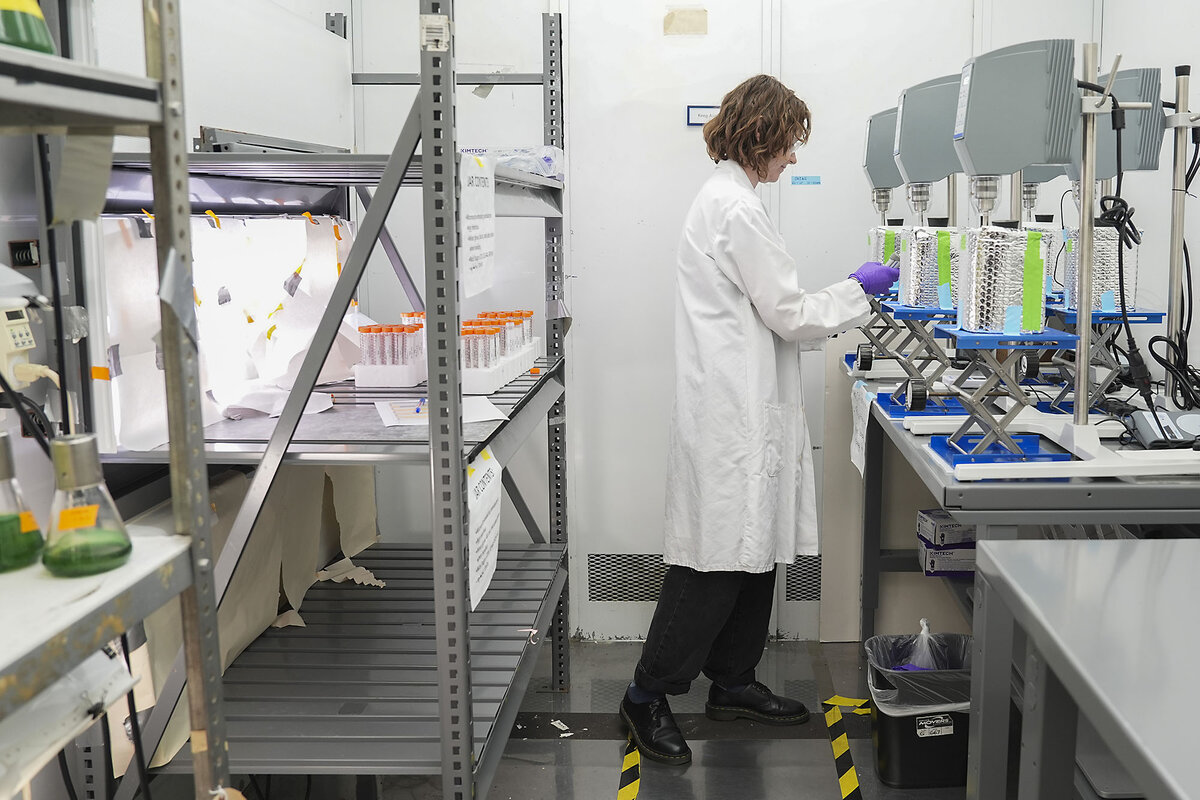The EPA recently strengthened regulations on so-called PFAS, or “forever chemicals,” in drinking water. A next step, some experts say, is reducing the creation of these chemicals in the first place.

Why is Christian Science in our name?
Our name is about honesty. The Monitor is owned by The Christian Science Church, and we’ve always been transparent about that.
The Church publishes the Monitor because it sees good journalism as vital to progress in the world. Since 1908, we’ve aimed “to injure no man, but to bless all mankind,” as our founder, Mary Baker Eddy, put it.
Here, you’ll find award-winning journalism not driven by commercial influences – a news organization that takes seriously its mission to uplift the world by seeking solutions and finding reasons for credible hope.
Explore values journalism About usMonitor Daily Podcast
- Follow us:
- Apple Podcasts
- Spotify
- RSS Feed
- Download
 Amelia Newcomb
Amelia Newcomb
Several stories today confront the difficulty of addressing root causes in very different circumstances.
Take PFAS – “forever chemicals’’ ending up in water supplies. The Environmental Protection Agency just issued new standards for drinking water. But tackling the problem at its source – before the water hits taps at home – is complicated amid scattershot state efforts. Meanwhile, on Capitol Hill, as the House debates aid to Ukraine, Israel, and Taiwan, our correspondent is finding that the conversation often skates over fundamental issues that would be much harder to take on.
And don’t miss our review of the film “We Grown Now.” Peter Rainer shares how his willingness, years ago, to reconsider an assumption he had made had a powerful impact on how he watched this film.
Already a subscriber? Log in
Help fund Monitor journalism for $11/ month
Monitor journalism changes lives because we open that too-small box that most people think they live in. We believe news can and should expand a sense of identity and possibility beyond narrow conventional expectations.
Our work isn't possible without your support.
Today’s stories
And why we wrote them
( 5 min. read )
Today’s news briefs
• Antisemitism hearing: Lawmakers on a U.S. congressional committee accuse Columbia University President Nemat Shafik of failing to protect Jewish students on campus, echoing accusations leveled against other elite university leaders at a December hearing.
• Maine gun legislation: The state adopts a number of gun and mental health proposals nearly six months after an Oct. 25 shooting claimed 18 lives.
• Larry Nassar case settlements: The U.S. Justice Department has agreed to pay approximately $100 million to settle claims with about 100 people who were sexually assaulted by sports doctor Larry Nassar.
• Mayorkas impeachment update: The Senate dismisses all impeachment charges against Homeland Security Secretary Alejandro Mayorkas, ending the House Republican push to remove the Cabinet secretary over his handling of the U.S.-Mexico border.
( 6 min. read )
Lawmakers face increasing political pressure from within their parties over aid to Israel and Ukraine as the presidential election approaches. Some say politics have obscured serious security debates.
Patterns
( 4 min. read )
When Arab neighbors intercepted Iranian missiles aimed at Israel, they made Washington’s vision of a “new Middle East” a reality. Will Israel sign up for that new future?
( 6 min. read )
Prime Minister Narendra Modi is expected to easily win a third term during India’s general election. The engine of his popularity? A long-standing ideology that seeks to transform India from a secular nation into a Hindu one.
Books
( 3 min. read )
Tales of reinvention and courage are threaded through our reviewers’ picks for the 10 best books of April – including a globe-trotting adventure story and a history of the animal rights movement.
Film
( 3 min. read )
For the Monitor’s reviewer, the young boys in “We Grown Now” exude something that is often difficult to find believable amid tough surroundings: innocence. The new film, he says, honors “just being a kid.”
The Monitor's View
( 2 min. read )
Every now and then, an election draws back a curtain, revealing a society striving toward its higher ideals. Mexico is in the middle of such revelation.
On June 2, voters will elect a new president, Congress, and thousands of local officials. Their top concern is violent crime, polls show. That is understandable. Some 200 armed groups operate throughout the country. The campaign is already on course to have the most assassinations or other acts of political aggression in history, the Wilson Center reports.
It may be surprising, then, that violent intimidation is not the prevailing sentiment among Mexico’s 130 million citizens. In weekly surveys by MilenIA, Central de Datos e Inteligencia Artificial, a social media tracker, Mexicans described their outlook for the country more with words such as “joy” and "trust” than with words such as “anger” and “fear.” After the first presidential debate last week, positive reactions outweighed negative reactions by as much as 80%.
One reason for that optimism is a sense of history being made. The two top presidential candidates are women. By a large margin (52% to 15%), voters said a female president is the best option for the future. That view is nearly equally held by men and women, polling by the Americas Society/Council of the Americas has found.
The qualifications of the two main candidates are a good part of their appeal. Claudia Sheinbaum, representing the ruling party, holds a Ph.D. in energy engineering. She served on a United Nations panel on climate change that won a Nobel Peace Prize. As mayor of Mexico City from 2018 to 2023, she oversaw a dramatic reduction in the capital’s homicide rate. Her opponent, Xóchitl Gálvez, is also a trained engineer. She lifted herself out of poverty to a distinguished career, first in business and now as a senator.
Mexico’s struggle against organized crime is also a chronicle of its growth into democratic maturity. The country broke free from single-party rule only in the late 1990s. Since then, it has been seeking models of law enforcement and political pluralism immune from the corrupting influence of the cartels.
This election marks an important step in that evolution. The two candidates – and a third, trailing further behind – differ on how to grow the economy. But their proposals for countering crime reflect similar degrees of compassion for people most vulnerable to violent crime, such as women and youth. Last month, the presidential candidates signed a National Commitment to Peace, organized by a coalition of interfaith religious leaders.
Ms. Sheinbaum emphasizes building schools and universities. Ms. Gálvez seeks higher salaries for police officers and their families. Ms. Sheinbaum talks about “the construction of peace.” Ms. Gálvez envisions “Mexico without fear.” One of them will be Mexico’s next president. A country weary of violence is already registering its approval with joy and trust.
A Christian Science Perspective
Each weekday, the Monitor includes one clearly labeled religious article offering spiritual insight on contemporary issues, including the news. The publication – in its various forms – is produced for anyone who cares about the progress of the human endeavor around the world and seeks news reported with compassion, intelligence, and an essentially constructive lens. For many, that caring has religious roots. For many, it does not. The Monitor has always embraced both audiences. The Monitor is owned by a church – The First Church of Christ, Scientist, in Boston – whose founder was concerned with both the state of the world and the quality of available news.
( 4 min. read )
Looking to God, divine Love, for guidance empowers us to express and experience more integrity in our lives.
Viewfinder

A look ahead
Thank you for joining us today. Please come back tomorrow for our interview with Pulitzer Prize-winning historian Doris Kearns Goodwin about her newest book.









